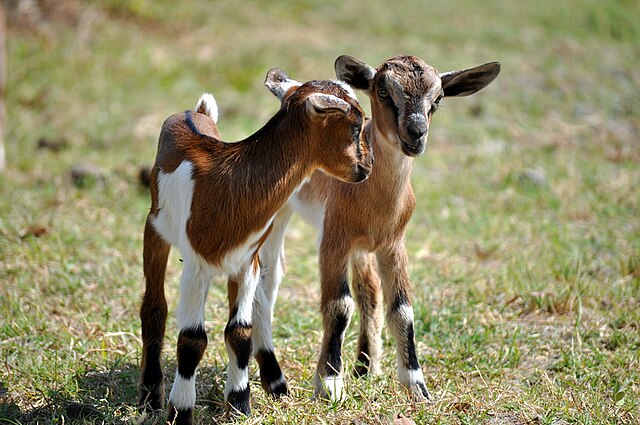
During goat kidding season, it always best to be prepared. Keep these items in an easy to carry box as a kidding kit. Keep everything you may need in one place. Most births go well and will require little or no assistance, but problems can happen, so it is always a good idea to keep a close eye on does that are close to kidding.
Kidding Supply Kit
- Flashlight & batteries – For those nighttime deliveries.
- Latex gloves – In case you must assist.
- OB Lube – In case you must “go in” to assist.
- 7% iodine – To treat the umbilical cord to prevent navel problems.
- Small spray bottle or film container – for dipping or spraying the umbilical cord with iodine.
- Dental floss – To tie the umbilical cord, if necessary.
- Blunt nosed scissors – For cutting umbilical cord if it is too long.
- Alcohol – to sterilize tools.
- Baby nasal aspirator – To remove fluids from a newborn’s mouth & nose, if necessary.
- 3 clean towels & 2 washcloths – To dry kids to prevent chill & dry your hands.
- Bottle & Pritchard Nipple – In case you need to bottle feed.
- Lamb / kid puller – In case of a kid that is positioned wrong. (Usually just your hand is enough to help a doe that needs help, but it is a good idea to have one).
- Weak lamb syringe & feeding tube – To feed kids too weak to nurse.
- Small scale – To get a birth weight on the kids.
- Feed bag or garbage bag – For picking up the afterbirth.
- Soap & warm water – for washing up in case you need to assist.
- Small notebook & pen – to record birth weights, etc.
- Digital thermometer – To check the temperature of chilled kids.
- Quiet hair dryer – to warm a mildly chilled kid.
- Phone numbers of 2 goat knowledgeable veterinarians – in case of an emergency.
The above list is for suggestions and ideas for supplies in your kidding kit, but keep in mind that breeders differ on what supplies and procedures they use. Weather, CAE prevention in dairy goats and other factors play a role in procedures and supplies needed for each farm.
Kidding Tips
Reduce Stress
Always handle any goat, but especially bred does with care and in a manner that will not stress them.
Vaccinate
Give your pregnant does their CD/T vaccination boosters 4 weeks before they kid to protect the mother and assure she passes those good antibodies on to her newborns. This is also a good time to check her for anemia, usually caused by worms. Pull down the lower eyelid & make sure it is a healthy dark pink color, not pale or white. An anemic goat may not produce milk like she should at kidding.
Colostrum
It is a very good idea to have frozen colostrum on hand for an emergency because it is imperative that the newborn kids get colostrum as soon after birth as possible. It contains the antibodies needed to help keep the newborn kid healthy. It is a good idea to milk out a little colostrum from a doe that has recently kidded after her kids have nursed, then freeze it in an ice cube tray and store the cubes in Ziplock bags in the freezer for future emergency use.
Check Teat Condition
After the kids are born, make sure the doe’s teats are not plugged so the kids can get their colostrum.
Molasses
Give the doe some warm water with some molasses in it after she kids for extra energy and to help replace fluids, she will relish it.
Warm Them Up First
Do not feed a severely chilled kid, warm them up first because a chilled kid cannot digest milk and will not want to nurse.
Help Prevent Infection
If you do have to go in to assist, it is a good idea to treat that doe with a round of Penicillin to prevent infection.
Check for Afterbirth
The doe should pass her afterbirth within 12 hours of kidding if she does not a veterinarian should be consulted. Never pull the afterbirth out of a doe as this can result in serious damage to the doe, let her expel it naturally.
Deworm the Doe
Deworm the doe the day after she kids; this is a time when worms can get out of hand because of stress and hormonal changes that result in a dramatic rise in worm eggs.
Did You Know
The Ancient Greeks used sheep bones for dice.
During WWI, Woodrow Wilson’s wife grazed sheep on the White House lawn.
Sheep theft is still legally a hangable offence in Scotland.
In biblical times, wool was left outside at night to absorb the dew and wrung out in the morning.
The sheep industry began in central Asia over 10,000 years ago. Spinning started in 3500 B.C.E.
One pound of wool can make ten miles of spun yarn.
Sheep prefer to drink running water.
There were at least 2386 different species of sheep in Wales before it was inhabited.
Related Articles & Free Email Newsletter Sign Up
10 Steps to Eliminating Hypothermia in Newborn Goats


Comment here